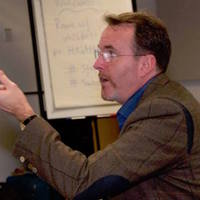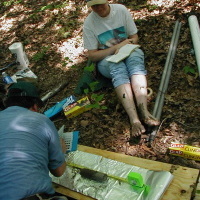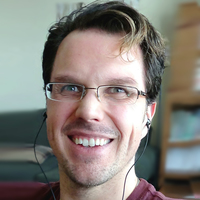
Alexander Gebharter
I am an assistant professor at the Department of Biomedical Sciences and Public Health at the Marche Polytechnic University (UNIVPM) and co-director of the Center for Philosophy, Science, and Policy (CPSP). I am principal investigator of the PRIN PNRR project Controlling and Utilizing Uncertainty in the Health Sciences (CUUHS), an interdisciplinary cooperation between researchers at UNIVPM and the University of Turin, and a member of the SNF and DFG funded research project Beyond Causal Exclusion: New Challenges for Multi-Level Causal Models. Before, I was principal investigator of the DFG funded research project Interventions and Mechanistic Hierarchies at the Munich Center for Mathematical Philosophy (MCMP) at the Ludwig Maximilian University of Munich (LMU), a postdoctoral researcher at the Department of Theoretical Philosophy at the University of Groningen, and a research fellow at the Duesseldorf Center for Logic and Philosophy of Science (DCLPS) at the University of Duesseldorf.
I obtained my PhD from the University of Duesseldorf and my MA from the University of Salzburg. My research interests lie in philosophy of science and its intersection with epistemology, metaphysics, and philosophy of mind. I am especially interested in causation and related topics. For more information on my research, klick here.
I am editor-in-chief of KRITERION — Journal of Philosophy, an open access journal that is intended as a platform for philosophical discussion within the tradition of analytic philosophy, and honorary treasurer of the German Society for Philosophy of Science (GWP).
Address: Center for Philosophy, Science, and Politics
Department of Biomedical Sciences and Public Health
Faculty of Medicine and Surgery
Marche Polytechnic University
Via Tronto 10/B
60126 Ancona AN
Italy
I obtained my PhD from the University of Duesseldorf and my MA from the University of Salzburg. My research interests lie in philosophy of science and its intersection with epistemology, metaphysics, and philosophy of mind. I am especially interested in causation and related topics. For more information on my research, klick here.
I am editor-in-chief of KRITERION — Journal of Philosophy, an open access journal that is intended as a platform for philosophical discussion within the tradition of analytic philosophy, and honorary treasurer of the German Society for Philosophy of Science (GWP).
Address: Center for Philosophy, Science, and Politics
Department of Biomedical Sciences and Public Health
Faculty of Medicine and Surgery
Marche Polytechnic University
Via Tronto 10/B
60126 Ancona AN
Italy
less
Related Authors
Will Davies
University of Oxford
Mauricio Suárez
Universidad Complutense de Madrid
Johannes Zachhuber
University of Oxford
Daniel D. Hutto
University of Wollongong
Charbel N El-Hani
UFBA - Federal University of Bahia
John Collier
University of KwaZulu-Natal
Teed Rockwell
Sonoma State University
Andrew Melnyk
University of Missouri Columbia
Kristen J Gremillion
Ohio State University
Marc Champagne
Kwantlen Polytechnic University
InterestsView All (38)










Uploads
Books by Alexander Gebharter
The author first counters David Hume’s challenge about whether causation is something ontologically real. The idea behind this is that good metaphysical concepts should behave analogously to good theoretical concepts in scientific theories. In the process, the author offers support for the theory of causal nets as indeed being a correct theory of causation.
Next, the book offers an application-oriented approach to the subject. The author shows that causal nets can investigate philosophical issues related to causation. He does this by means of two exemplary applications. The first consists of an evaluation of Jim Woodward’s interventionist theory of causation. The second offers a contribution to the new mechanist debate.
Introductory chapters outline all the formal basics required. This helps make the book useful for those who are not familiar with causal nets, but interested in causation or in tools for the investigation of philosophical issues related to causation.
Citation information: Gebharter, A. (2017). Causal nets, interventionism, and mechanisms: Philosophical foundations and applications. Synthese Library 381. Cham: Springer. doi:10.1007/978-3-319-49908-6
Papers by Alexander Gebharter
Citation information: Gebharter, A. & Hüttemann, A. (2025). Causal Bayes nets and token-causation: Closing the gap between token-level and type-level. Erkenntnis, 90, 43-65. doi:10.1007/s10670-023-00684-5
Citation information: Gebharter, A., & Osimani, B. (2025). The formal structure(s) of analogical inference. Erkenntnis. Advance online publication. doi:10.1007/s10670-025-00934-8
Citation information: Sikorski, M., & Gebharter, A. (2025). The criminalist’s paradox as a counterexample to the principle of total evidence. British Journal for the Philosophy of Science. Advance online publication. doi:10.1086/735282
Citation information: Gebharter, A., & Leuridan, B. (2024). Modelling cyclic causal structures. In P. M. K. Illari, & F. Russo (Eds.), Routledge handbook of causality and causal methods (pp. 269-280). Routledge. doi:10.4324/9781003528937-30
Citation information: Gebharter, A., & Sekatskaya, M. (2024). Mental causation, interventionism, and probabilistic supervenience. Synthese, 203, 206. doi:10.1007/s11229-024-04608-w
Citation information: Sekatskaya, M., & Gebharter, A. (2024). Supervenient fixity and agential possibilities. Theoria. Advance online publication. doi:10.1111/theo.12551
Citation information: Gebharter, A., & Eronen, M. I. (2023). Quantifying proportionality and the limits of higher-level causation and explanation. British Journal for the Philosophy of Science, 74(3), 573-601. doi:10.1086/714818
Citation information: Gebharter, A. & Feldbacher-Escamilla, C. J. (2023). Unification and explanation from a causal perspective. Studies in History and Philosophy of Science, 99, 28-36. doi:10.1016/j.shpsa.2022.12.005
Citation information: Gebharter, A. (2022). A causal Bayes net analysis of Glennan’s mechanistic account of higher-level causation (and some consequences). British Journal for the Philosophy of Science, 73(1), 185-210. doi:10.1093/bjps/axz034
Citation information: Gebharter, A., Sekatskaya, M., & Schurz, G. (2022). Free will, control, and the possibility to do otherwise from a causal modeler's perspective. Erkenntnis, 87(4), 1889-1906. doi:10.1007/s10670-020-00281-w
Citation information: de Grefte, J., & Gebharter, A. (2021). The causal theory of knowledge revisited: An interventionist approach. Ratio, 34(3), 193-202. doi:10.1111/rati.12304
Citation information: Gebharter, A., & Fischer, F. (2021). A causal Bayes net analysis of dispositions. Synthese, 198(5), 4873-4895. doi:10.1007/s11229-019-02374-8
Citation information: Gebharter, A. & Koch, D. (2021). Combining causal Bayes nets and cellular automata: A hybrid modelling approach to mechanisms. British Journal for the Philosophy of Science, 72(3), 839-864. doi:10.1093/bjps/axy049
Citation information: Henderson, L., & Gebharter, A. (2021). The role of source reliability in belief polarisation. Synthese, 199(3-4), 10253-10276. doi:10.1007/s11229-021-03244-y
Citation information: Feldbacher-Escamilla, C. J., & Gebharter, A. (2020). Confirmation based on analogical inference: Bayes meets Jeffrey. Canadian Journal of Philosophy, 50(2), 174-194. dot:10.1017/can.2019.18
Citation information: Gebharter, A., & Retzlaff, N. (2018). A new proposal how to handle counterexamples to Markov causation a la Cartwright, or: Fixing the chemical factory. Synthese. Advance online publication. doi:10.1007/s11229-018-02014-7
Citation information: Feldbacher-Escamilla, C. J., & Gebharter, A. (2019). Modeling creative abduction Bayesian style. European Journal for Philosophy of Science, 9(1), 9. doi:10.1007/s13194-018-0234-4
Citation information: Gebharter, A., Graemer, D., & Scheffels, F. H. (2019). Establishing backward causation on empirical grounds: An interventionist approach. Thought: A Journal of Philosophy, 8(2), 129-138. doi:10.1002/tht3.414
The author first counters David Hume’s challenge about whether causation is something ontologically real. The idea behind this is that good metaphysical concepts should behave analogously to good theoretical concepts in scientific theories. In the process, the author offers support for the theory of causal nets as indeed being a correct theory of causation.
Next, the book offers an application-oriented approach to the subject. The author shows that causal nets can investigate philosophical issues related to causation. He does this by means of two exemplary applications. The first consists of an evaluation of Jim Woodward’s interventionist theory of causation. The second offers a contribution to the new mechanist debate.
Introductory chapters outline all the formal basics required. This helps make the book useful for those who are not familiar with causal nets, but interested in causation or in tools for the investigation of philosophical issues related to causation.
Citation information: Gebharter, A. (2017). Causal nets, interventionism, and mechanisms: Philosophical foundations and applications. Synthese Library 381. Cham: Springer. doi:10.1007/978-3-319-49908-6
Citation information: Gebharter, A. & Hüttemann, A. (2025). Causal Bayes nets and token-causation: Closing the gap between token-level and type-level. Erkenntnis, 90, 43-65. doi:10.1007/s10670-023-00684-5
Citation information: Gebharter, A., & Osimani, B. (2025). The formal structure(s) of analogical inference. Erkenntnis. Advance online publication. doi:10.1007/s10670-025-00934-8
Citation information: Sikorski, M., & Gebharter, A. (2025). The criminalist’s paradox as a counterexample to the principle of total evidence. British Journal for the Philosophy of Science. Advance online publication. doi:10.1086/735282
Citation information: Gebharter, A., & Leuridan, B. (2024). Modelling cyclic causal structures. In P. M. K. Illari, & F. Russo (Eds.), Routledge handbook of causality and causal methods (pp. 269-280). Routledge. doi:10.4324/9781003528937-30
Citation information: Gebharter, A., & Sekatskaya, M. (2024). Mental causation, interventionism, and probabilistic supervenience. Synthese, 203, 206. doi:10.1007/s11229-024-04608-w
Citation information: Sekatskaya, M., & Gebharter, A. (2024). Supervenient fixity and agential possibilities. Theoria. Advance online publication. doi:10.1111/theo.12551
Citation information: Gebharter, A., & Eronen, M. I. (2023). Quantifying proportionality and the limits of higher-level causation and explanation. British Journal for the Philosophy of Science, 74(3), 573-601. doi:10.1086/714818
Citation information: Gebharter, A. & Feldbacher-Escamilla, C. J. (2023). Unification and explanation from a causal perspective. Studies in History and Philosophy of Science, 99, 28-36. doi:10.1016/j.shpsa.2022.12.005
Citation information: Gebharter, A. (2022). A causal Bayes net analysis of Glennan’s mechanistic account of higher-level causation (and some consequences). British Journal for the Philosophy of Science, 73(1), 185-210. doi:10.1093/bjps/axz034
Citation information: Gebharter, A., Sekatskaya, M., & Schurz, G. (2022). Free will, control, and the possibility to do otherwise from a causal modeler's perspective. Erkenntnis, 87(4), 1889-1906. doi:10.1007/s10670-020-00281-w
Citation information: de Grefte, J., & Gebharter, A. (2021). The causal theory of knowledge revisited: An interventionist approach. Ratio, 34(3), 193-202. doi:10.1111/rati.12304
Citation information: Gebharter, A., & Fischer, F. (2021). A causal Bayes net analysis of dispositions. Synthese, 198(5), 4873-4895. doi:10.1007/s11229-019-02374-8
Citation information: Gebharter, A. & Koch, D. (2021). Combining causal Bayes nets and cellular automata: A hybrid modelling approach to mechanisms. British Journal for the Philosophy of Science, 72(3), 839-864. doi:10.1093/bjps/axy049
Citation information: Henderson, L., & Gebharter, A. (2021). The role of source reliability in belief polarisation. Synthese, 199(3-4), 10253-10276. doi:10.1007/s11229-021-03244-y
Citation information: Feldbacher-Escamilla, C. J., & Gebharter, A. (2020). Confirmation based on analogical inference: Bayes meets Jeffrey. Canadian Journal of Philosophy, 50(2), 174-194. dot:10.1017/can.2019.18
Citation information: Gebharter, A., & Retzlaff, N. (2018). A new proposal how to handle counterexamples to Markov causation a la Cartwright, or: Fixing the chemical factory. Synthese. Advance online publication. doi:10.1007/s11229-018-02014-7
Citation information: Feldbacher-Escamilla, C. J., & Gebharter, A. (2019). Modeling creative abduction Bayesian style. European Journal for Philosophy of Science, 9(1), 9. doi:10.1007/s13194-018-0234-4
Citation information: Gebharter, A., Graemer, D., & Scheffels, F. H. (2019). Establishing backward causation on empirical grounds: An interventionist approach. Thought: A Journal of Philosophy, 8(2), 129-138. doi:10.1002/tht3.414
Citation information: Gebharter, A. (2017). Causal exclusion and causal Bayes nets. Philosophy and Phenomenological Research, 95(2), 353–375. doi:10.1111/phpr.12247
Kristina Engelhard, Christian J. Feldbacher-Escamilla, Alexander Gebharter, & Ansgar Seide: Inductive metaphysics: Editors’ introduction;
Amanda Bryant: Epistemic infrastructure for a scientific metaphysics;
Gerhard Schurz: Abduction as a method of inductive metaphysics;
Peter Simons: The long and winding road: Folly and feedback in metaphysics;
Ralf Busse: Against metaphysical structuralism: A case study on the apriori dimension within inductive metaphysics;
Matthew Tugby: Abduction and the scientific realist case for properties;
Kristina Engelhard: Methods and roles of experience in Christian Wolff’s “Deutsche Metaphysik”;
Arnauld Pelletier: Leibniz’s inductive challenge: First experiences and the metaphysics of monads;
Ansgar Seide: Analogical inference in Gustav Theodor Fechner’s inductive metaphysics;
Citation information:Engelhard, K., Feldbacher-Escamilla, C. J., Gebharter, A., & Seide, A. (Eds.). (2021). Inductive metaphysics: Contemporary and historical issues [Special issue]. Grazer Philosophische Studien, 98(1)
Christian J. Feldbacher-Escamilla, Alexander Gebharter, Peter Brössel, & Markus Werning: Introduction to the special issue “Logical perspectives on science and cognition”;
Wolfgang Spohn: Defeasible Normative Reasoning;
Jonathan Evans & Shira Elqayam: How and Why we Reason from Is to Ought;
Ioannis Votsis: Theory-Ladenness: Testing the “Untestable”;
Alexander Gebharter & Nina Retzlaff: A new proposal how to handle counterexamples to Markov causation a la Cartwright, or: Fixing the chemical factory;
Andreas Hüttemann: Processes, pre-emption and further problems;
Ulrike Hahn, Jens Ulrik Hansen, & Erik Olsson: Truth Tracking Performance of Social Networks;
Christian J. Feldbacher-Escamilla: An Optimality-Argument for Equal Weighting;
Igor Douven: Scoring in Context;
Ilkka Niiniluoto: Truthlikeness: Old and new debates;
Theo Kuipers: Refined nomic truth approximation by revising models and postulates;
Gustavo Cevolani & Roberto Festa: A partial consequence account of truthlikeness;
Elke Brendel: Truthmaker Maximalism and the Truthmaker Paradox;
Gerhard Schurz: Twelve great papers: Comments and replies
Citation information: Feldbacher-Escamilla, C. J., Gebharter, A., Brössel, P., & Werning, M. (Eds.). (2020). Logical perspectives on science and cognition [Special issue]. Synthese, 197(4).
Christian J. Feldbacher-Escamilla, Alexander Gebharter, & Gerhard Schurz: Philosophy of science between the natural sciences, the social sciences, and the humanities. Introduction;
Alexander Rosenberg: Why social science is biological science;
Gila Sher: Truth and scientific change;
Christian Wallmann: A Bayesian solution to the conflict of narrowness and precision in direct inference;
Christian J. Feldbacher-Escamilla: Optimization in a synchronized prediction Setting;
Alexander Christian: On the suppression of medical evidence;
Markus Schrenk: The emergence of better best system laws;
Carsten Held: Ceteris-paribus qualifiers;
Beate Krickel: Making sense of interlevel causation in mechanisms from a metaphysical perspective;
Stathis Psillos: Induction and natural necessities;
Citation information: Feldbacher-Escamilla, C. J., Gebharter, A., & Schurz, G. (Eds.). (2017). Selected papers of the second conference of the German Society for Philosophy of Science (GWP), Düsseldorf, March 8–11, 2016 [Special issue]. Journal for General Philosophy of Science, 48(3).
Alexander Gebharter & Gerhard Schurz: Introduction to the special issue "Causation, probability, and truth – the philosophy of Clark Glymour";
Jiji Zhang & Peter Spirtes: The three faces of faithfulness;
Frederick Eberhardt: Green and grue causal variables;
James Woodward: The problem of variable choice;
Gerhard Schurz & Alexander Gebharter: Causality as a theoretical concept: Explanatory warrant and empirical content of the theory of causal nets;
Gerhard Schurz & Alexander Gebharter: Erratum to: Causality as a theoretical concept: Explanatory warrant and empirical content of the theory of causal nets;
York Hagmayer: Causal Bayes nets as psychological theories of causal reasoning – evidence from psychological research;
Paul Näger: The causal problem of entanglement;
Christopher Hitchcock: Conditioning, intervening, and decision;
Vera Hoffmann-Kolss: Of brains and planets: On a causal criterion for mind-brain identities;
Kevin Kelly, Konstantin Genin, & Hanti Lin: Realism, rhetoric and reliability;
Sylvia Wenmackers & Jan-Willem Romeijn: New theory about old evidence: A framework for open-minded Bayesianism;
Clark Glymour: Clark Glymour's responses to the contributions to the Synthese special issue "Causation, probability, and truth – the philosophy of Clark Glymour";
Citation information: Gebharter, A., & Schurz, G. (Eds.). (2016). Causation, probability, and truth – the philosophy of Clark Glymour [Special issue]. Synthese, 193(4).
Alexander Gebharter & Gerhard Schurz: Editors' introduction;
Stathis Psillos: Regularities, natural patterns and laws of nature;
Andreas Hüttemann: Scientific practice and necessary connections;
Erik Weber & Merel Lefevere: The role of explanations in micro-explanations of physical laws;
Gerhard Schurz: Unification and explanation: Explanation as a prototype concept. A reply to Weber and van Dyck, Gijsbers, and de Regt;
Victor Gijsbers: Unification as a measure of natural classification.
Citation information: Gebharter, A., & Schurz, G. (Eds.). (2014). Explanation, causality, and unification [Monographic section]. Theoria – An International Journal for Theory, History and Foundations of Science, 29(1), 3–82.
The organization committee: Figures and facts;
Moritz Cordes: Rudolf Carnaps verschiedene Scheinproblemkonzeptionen;
Magdalena Eckes: Elektronen, Amseln, Finken. Wovon können unsere nicht-inferenziellen Beobachtungsüberzeugungen handeln?;
Ludwig J. Jaskolla: On storms in teacups: Limitations of 3D-4D-equivalence;
Max Seeger: A critique of the incentives argument from inequality;
Tim Seuchter: A new approach to the grounding of abstract concepts;
Christian Wallmann: Theorie der Konsequenzoperationen und Grundbegriffe der Logik.
Citation information: Anglberger, A. J. J., Feldbacher, C. J., Gebharter, A., & Gugerell, S. H. (Eds.). (2011). Salzburg Conference for Young Analytic Philosophy 2010 [Special issue]. Kriterion – Journal of Philosophy, 25(1).
Citation Information: Engelhard, K., Feldbacher-Escamilla, C. J., Gebharter, A., & Seide, A. (2021). Inductive metaphysics: Editors' introduction [Introduction]. Grazer Philosophische Studien, 98(1), 1-26. doi:10.1163/18756735-00000129
Citation information: Feldbacher-Escamilla, C. J., Gebharter, A., Brössel, B., & Werning, M. (2020). Introduction to the special issue “Logical perspectives on science and cognition” [Introduction]. Synthese. Synthese, 197(4), 1381-1390. doi:10.1007/s11229-019-02334-2
Citation information: Feldbacher-Escamilla, C. J., Gebharter, A., & Schurz, G. (2017). Philosophy of science between the natural sciences, the social sciences, and the humanities [Introduction]. Journal for General Philosophy of Science, 48(3), 317–326. doi:10.1007/s10838-017-9378-8
Citation information: Christian, A., Feldbacher, C. J., & Gebharter, A. (2016). Spotlight on the Düsseldorf Center for Logic and Philosophy of Science (DCLPS). EPSA Newsletter. Retrieved March 1, 2016, from http://philsci.eu/Newsletter-01-2016-Spotlight-on-Research
Citation information: Christian, A., Feldbacher-Escamilla, C. J., & Gebharter, A. (2017). The Second International Conference of the German Society for Philosophy of Science (GWP.2016), 8-11 March 2016 [Conference report]. Journal for General Philosophy of Science, 48(2), 289–291. doi:10.1007/s10838-016-9358-4
Citation information: Gebharter, A., & Schurz, G. (2016). Introduction to the special issue "Causation, probability, and truth – the philosophy of Clark Glymour" [Introduction]. Synthese, 193(4), 1007–1010. doi:10.1007/s11229-015-1007-7
Citation information: Schurz, G., & Gebharter, A. (2016). Erratum to: Causality as a theoretical concept: Explanatory warrant and empirical content of the theory of causal nets [Erratum]. Synthese, 193(4), 1105–1106. doi:10.1007/s11229-016-1019-y
Citation information: Christian, A., Feldbacher, C. J., Gebharter, A., & Retzlaff, N. (2015). European Philosophy of Science Association, 23-26 September [Conference report]. The Reasoner, 9(11), 95.
Citation information: Gebharter, A. (2015). Erratum to: Solving the flagpole problem [Erratum]. Journal for General Philosophy of Science, 46(2), 245. doi:10.1007/s10838-015-9311-y
Citation information: Gebharter, A. (2014). Addendum to: A formal framework for representing mechanisms? [Addendum]. Retrieved September 25, 2014, from http://philpapers.org/archive/GEBATQ.pdf
Citation information: Gebharter, A., & Schurz, G. (2014). Editors’ introduction [Introduction]. Theoria – An International Journal for Theory, History and Foundations of Science, 29(1), 5–7. doi:10.1387/theoria.10708
Citation information: Hempel, C. G. (2013). Wissenschaft und menschliche Werte (A. Gebharter, Trans.). In G. Schurz, & M. Carrier (Eds.), Werte in den Wissenschaften: Neue Ansätze zum Werturteilsstreit (pp. 118–140). Berlin: Suhrkamp. (Original work published 1965).
Citation information: Unterhuber, M., & Gebharter, A. (2013). The philosophy of Clark Glymour, 13–15 June [Conference report]. The Reasoner, 7(9), 109.
Citation information: Anglberger, A. J. J., Feldbacher, C. J., Gebharter, A., & Gugerell, S. H. (2012). Salzburg Conference for Young Analytic Philosophy 2011 [Conference report]. Kriterion – Journal of Philosophy, 26, 104–109.
Citation information: Schurz, G., & Gebharter, A. (2012). Explanation, causality, and unification, 11–12 November [Conference report]. The Reasoner, 6(1), 9–10.
do otherwise at the agential level. This paper takes up that challenge. Based on assumptions to which List’s approach is committed, I provide a model involving both, the physical level and the agential level, that establishes the connection between physical determinism and the impossibility to do otherwise at the agential level that is needed to refute freedom as a higher-level phenomenon in the sense of List.